- Home
- John Boyne
A Ladder to the Sky Page 2
A Ladder to the Sky Read online
Page 2
‘But I insist.’
‘Erich, then,’ he said quietly, testing out the word on his tongue and looking, I thought, a little nervous. Perhaps it was my ego or my awoken desires or a combination of the two that made me happy to feel the stream of veneration making its delicate journey from his lips to my ears. ‘You’re sure that you want to go out?’ he asked me. ‘I don’t want to intrude upon your time. You’re not too tired?’
‘I’m not tired at all,’ I said, even though I was quite exhausted from an early flight and the disappointing event. ‘Please, lead the way. I daresay you know the city better than I do.’
Standing up, I cursed myself for the slight groan that emerged from my mouth as my limbs adjusted to being erect once again and, without planning to do so, reached across and held on to him by the upper arm for a moment. The muscle was hard and tightened beneath my grip.
‘Where shall we go?’ I asked, and he named a bar on the other side of the Tiergarten, close to the Brandenburg Gate. I felt a momentary hesitation, as this would bring us close to the ruined Reichstag, a place I did not particularly care to revisit, but nodded. I could not risk him changing his mind.
‘It’s not far,’ he said, perhaps sensing my reluctance. ‘Ten minutes if we take a taxi. And it’s usually pretty quiet at this time of night. We can talk without having to shout over the noise.’
‘Splendid,’ I said. ‘Lead on.’
And as we made our way through the hotel doors he uttered the phrase that I usually dreaded but which now, inexplicably, sent waves of excitement through my body.
‘I’m a writer too,’ he said, sounding a little embarrassed at the revelation, as if he’d admitted to a desire to fly to the moon. ‘Or I’m trying to be, anyway.’
2. Copenhagen
My visit to Denmark was scheduled for three days in early April; press interviews followed by a public reading at the Royal Library the following evening. I was offered an extra night’s accommodation by my Danish publisher so that I could see something of the city and I accepted, booking a second room at my own expense for Maurice, who had agreed to accompany me in the slightly nebulous role of personal assistant. Anxious that our rooms be located adjacent to each other, I sent a carefully worded request to the hotel two weeks in advance. This, I told myself, was so that my young friend would be nearby should I need him. It was one of many lies I told myself during the year of our acquaintance.
At the end of our shared evening in Berlin six weeks earlier, I had given Maurice my address, inviting him to stay in touch, and upon my return to College I waited hopefully for a letter, but none came. I began to wonder whether he’d misplaced the piece of paper on which I’d written it or perhaps he had sent me something and it had got lost in the post. I considered initiating a correspondence myself, writing to him care of the Savoy, but every letter I wrote seemed more tragic than the last and so I gave the whole thing up as a bad job. Finally, after almost a month of silence, I assumed I wouldn’t hear from him but with poetic timing a large envelope arrived that same day with the name ‘Maurice Swift’ and a Berlin return address inscribed across the back.
In his letter, he apologized for taking so long to get in touch, claiming to have been uncertain whether he should take advantage of my proposal to read his work or whether it was simply a polite offer on my part after too many glasses of wine. Nevertheless, he enclosed a short story, titled ‘The Mirror’, and asked whether I might take a look, begging me not to spare his feelings.
Of course, I had no intention of going back on my word but to my disappointment his story proved to be nothing special. The central character, an obvious fictional representation of himself, was presented as shy and self-deprecating, amusingly inept in his relations with girls, and prone to finding himself in disastrous sexual encounters. And yet there was a touch of vanity to the exercise, for it was clear that he was considered utterly charming by everyone who crossed his path. But for all the mundaneness of the plot, the writing was impressive. He’d clearly worked hard on his sentences and I seized on this as evidence of a dormant talent. If only the story itself were not so boring, I decided, then it might even have been publishable.
Anxious not to appear too eager, however, and recalling how long it had taken him to write to me, I waited three interminable days before replying, sending a carefully considered critical analysis of the piece, during which I tended towards praise while noting the occasional moment that I felt could benefit from a little more attention. In a postscript, I mentioned the Copenhagen trip and suggested that, as I was getting older and these journeys could be tiring, he might be interested in accompanying me. It would give you a sense of a writer’s life, I told him, hoping that this would prove incentive enough. Naturally I will pay all your expenses and offer a stipend in exchange for whatever small duties I might require of you while we’re away.
This time, he responded almost immediately with an excited ‘yes’ and plans were duly drawn up. In the week leading up to our departure, however, I became increasingly fretful of meeting him again, worried that an enjoyable evening in Berlin would turn into something awkward when we tried to replicate it over a longer period in Denmark. But no, Maurice proved amenable and friendly from the moment of our reunion and, if he noticed how intensely I stared at him, then he was kind enough not to remark upon the fact. The slightest thing caught my eye: a shirt with its top buttons undone offering a glimpse of bare skin beneath the fabric and the grooved cavity at the centre of his chest where the muscles separated, a gully I longed to explore; the manner in which his trousers would ride up slightly when he crossed his legs and the intoxicating ankle that appeared at such moments, for Maurice never wore socks, an affectation I found ridiculous and erotic in equal measure; the manner in which his tongue darted from his mouth to lick his lips whenever food arrived and how his appetite was never satisfied, like a farmhand at the end of a long day’s harvesting. I took note of all these observations and more. I wrote them down, I memorized them, I allowed the negatives to rest in my brain for later development, and as he talked I simply watched him, feeling rejuvenated by the presence of this boy in my life while all the time trying not to think about how painful it would be when he inevitably departed it again.
On our last day, I suggested a trip to Frederiksborg Castle on the vague pretence that I was considering a historical novel based around the fire of 1859 and the role of the Carlsberg brewer in the building’s reconstruction. He agreed and, fulfilling the role of assistant beautifully, booked two first-class train tickets and made some notes on the history and architecture of the palace, which he shared with me on the journey. After a few pleasant hours spent examining its treasures and walking the gardens, we found a small restaurant nearby where we sat at a corner table and ordered pints of local beer with plates of meatballs.
‘This is what I’ve always dreamed about,’ Maurice announced, looking around enthusiastically, his blue eyes lively and alert. ‘Being a professional writer and travelling to other countries to promote my work or undertake research for the next novel. Wouldn’t you like to give up teaching and write full time? You probably could now, I suppose, after the success of Dread.’
‘No,’ I said, shaking my head. ‘Cambridge has given me a home and a routine for more than forty years and I value that enormously. I could never stop writing, it’s an intrinsic part of who I am, but I don’t look forward to the day when I’m forced to retire from teaching.’
He took a notebook from his bag, a pale blue Leuchtturm 1917 with numbered pages and a ribbon band, and began to make some notes; he’d been doing this since our first conversations in Copenhagen and it flattered me enormously.
‘What?’ I asked, smiling at him. ‘Did I say something particularly wise?’
‘A home and a routine,’ he said, not looking up but scribbling away furiously. ‘And I’m writing something down about balance. You seem to have struck a good equilibrium between your work life and your artistic life. Perhaps I need
that too. Waiting tables doesn’t provide much intellectual stimulation.’
‘But I daresay it pays the rent,’ I replied. ‘Anyway, you can’t write all the time. There’s more to life than words and stories.’
‘Not for me there isn’t,’ he said.
‘That’s because you’re young and this is the life that you dream of. But once you have it, you might find that there are other things of equal importance. Companionship, for example. Love.’
‘Did you always want to write?’ he asked.
‘Yes,’ I replied. ‘As a boy, I had a peculiar obsession with stationery. There was a wonderful shop near where I grew up and I used to save my pennies to buy beautiful paper, and ink for my fountain pens. My grandfather was a historian and, from my fifth birthday onwards, he presented me with a different fountain pen every year, and they were treasures to me. I still have all but one.’
‘Did you lose the other?’ he asked.
‘No,’ I said. ‘I gave it as a gift to a friend of mine many years ago. I keep the rest now in my rooms in College. They remind me of my childhood, before the war, which I think was the happiest time in my life.’
‘And where was this?’ he asked. ‘Where did you grow up?’
‘Where we met. In Berlin.’
‘Forgive me,’ said Maurice, frowning a little. ‘But aren’t you Jewish?’
‘It depends on your definition of the word,’ I told him.
‘But you fought in the war?’
‘Not quite,’ I said. ‘I was a clerk at a Wehrmacht headquarters in the city. I’ve been quite open about that.’
‘Yes, but still I don’t understand.’
I glanced out the window at the tourists making their way across Møntportvejen Bridge towards the castle. ‘Both my parents were German,’ I explained, turning back to him. ‘My mother’s father, however, was Jewish. So, by blood, you could say that I am a quarter Jewish but of course the Jews don’t deal in fractions. There was a word used back then. Mischling. I first learned of it when the Nuremberg Laws were introduced in 1935. They stated that those with only one Jewish grandparent were a second-degree Mischling – or of mixed-birth – and approved for citizenship of the Reich. For the most part, second-degree Mischlings were safe from any form of persecution.’
‘And a first-degree Mischling?’ he asked.
‘Two Jewish grandparents. Much more dangerous.’
‘You must have known some of these.’
I felt a sharp pain across my chest. ‘One,’ I said. ‘One that I knew of, anyway. A girl.’
‘A friend of yours?’
I shook my head. ‘Not really, no. An acquaintance.’
‘But if you don’t mind my asking, if you were a quarter Jewish, did you not feel any sense of shame at working with the Nazis?’
‘Of course I did,’ I said. ‘But what else could I have done? Refused? I would have been shot. Or sent to the camps. And, like you, I wanted to be a writer, and in order to be a writer I needed to stay alive. My brother, Georg, worked for them too. Tell me, Maurice, in my situation, what would you have done?’
‘You have a brother?’
I shook my head. ‘He died very young,’ I told him. ‘We lost touch after the war, when I left Germany. A few years later I had a rather abrupt letter from his wife to say that he’d been killed in a tram accident and that was the end of that. Look, the truth is, who can have lived through those times and not feel some degree of shame over his actions?’
‘And yet you’ve never written about it,’ he said. ‘Or spoken of it in interviews.’
‘No,’ I admitted. ‘But please, let’s talk about something else. I prefer not to dwell on the past. Tell me about you instead. About your family.’
‘There’s not much to tell,’ he said with a sigh, and I could tell that he would have preferred to keep the focus on me. ‘My father is a pig farmer and my mother keeps house. I have five sisters and an older brother. I’m the youngest of the lot and the black sheep.’
‘Why so?’ I asked.
‘Because everyone else stayed at home and found a local to marry. And they’ve all done exactly what was expected of them. They’re farmers, coalminers, teachers. None of them has ever travelled, they haven’t even left Yorkshire. But I always wanted more. I wanted to see the world and to meet interesting people. My father said I had ideas above my station but I don’t believe in such things. I want to be—’
He stopped and looked down at his drink, shaking his head.
‘Finish that thought,’ I said, leaning forward. Had I been braver, I might have taken his hand. ‘You want to be what?’
‘I want to be a success,’ he replied, and perhaps I should have heard the deep intent in his tone and been frightened by it. ‘It’s all that matters to me. I’ll do whatever it takes to succeed.’
‘But of course,’ I told him, sitting back again. ‘A young man will always want to conquer the world. It’s the Alexandrian impulse.’
‘Some people think ambition is wrong,’ he said. ‘My father says dreaming of better things only sets you up for disappointment. But your work has made you happy, hasn’t it?’
‘It has,’ I agreed. ‘Immensely so.’
‘And did you never …’ He paused for a moment, an expression on his face that suggested he was uncertain how personal he could get. ‘Did you never marry?’
I took a sip from my glass and decided there was no reason to be disingenuous. If we were to have a friendship, then it was important that I should be honest with him from the start.
‘Of course, you realize that I’m homosexual,’ I said, looking him in the eye, and to his credit he didn’t look away.
‘I thought as much,’ he said. ‘I wasn’t certain. It’s not a theme that you explore in any of your books. And you’ve never addressed it publicly.’
‘I don’t care to talk about my private life to the press or in a room full of strangers,’ I said. ‘And as you know, I don’t write about love. It’s a subject that I’ve avoided scrupulously throughout my career.’
‘No, you’ve always written about loneliness.’
‘Exactly. But you mustn’t think that my writing is in any way autobiographical. Just because one is homosexual does not mean that one is lonely.’ He said nothing and I sensed an awkwardness in the air that discomfited me. ‘I hope it doesn’t make you uncomfortable to hear me speak of this.’
‘Not in the least,’ he said. ‘It’s 1988, after all. I don’t care about things like that. My best friend in Harrogate, Henry Rowe, was gay. I wrote one of my earliest stories about him, in fact. These labels mean nothing to me.’
‘I see,’ I said, uncertain what he meant by this. Was he suggesting that he did not discriminate between his friends on the basis of their sexuality or that he himself was prepared to have intimate relations with people of either gender? ‘And was your friend in love with you, do you think? It’s possible, of course. You are very beautiful.’
He blushed a little but ignored the question. ‘Did you ever try?’ he asked me. ‘With a girl, I mean? Actually, I shouldn’t have asked, should I? It’s none of my business.’
‘It’s fine,’ I said. ‘And no, I never did. It wasn’t something that would have worked at all. Perhaps you feel the same way about boys?’
He shrugged, and I knew that I was pushing too hard; I should pull back if I was not to frighten him away. ‘It’s not something I’ve ever given much thought to, if I’m honest,’ he said. ‘I want to live a life that’s open to anything. The only thing I know for sure in that regard is that I want to be a father someday.’
‘Really?’ I asked, surprised by this revelation. ‘That’s a curious desire in one so young.’
‘It’s something I’ve always wanted,’ he told me. ‘I think I’d be a good father. And speaking of my stories,’ he added then, sounding a little embarrassed to be bringing the subject up, but it was inevitable that we’d have to discuss them at some point. I’d read two or three more sin
ce our arrival in Copenhagen and, to my disappointment, had felt the same way towards them as I had towards ‘The Mirror’. Well written, certainly, but dull. ‘They’re amateur, I know, but—’
‘No,’ I said, interrupting him. ‘“Amateur” would be the wrong word. But they are clearly the work of someone who has yet to discover his voice. If you were to read some of the stories that I wrote at your age, you’d wonder why I ever bothered trying for a literary career.’ I paused, demanding honesty of myself. Already there was a degree of deceit in our relationship but on this subject, on the subject of writing, I felt honour bound to be truthful. ‘The fact is, you have skill, Maurice.’
‘Thank you.’
‘I can tell that you think about every word before committing it to the page and I’m impressed by your use of language. But it’s the stories themselves, you see. The subject matter. Therein lies the problem.’
‘You mean they’re boring?’
‘That would be too harsh,’ I replied. ‘But at times, they feel like stories I’ve read before. As if I can picture the books on your shelves. The ghosts of the writers you admire seem to slip into the cracks between the scenes. It takes a great deal of talent to write as well as you do but, ultimately, if your story is not engaging, if the reader doesn’t feel that it’s entirely yours, then it simply won’t work.’
He looked down at the table and nodded. I could see that he was crestfallen but what I had said was the truth and he needed to hear it; I owed him that much at least.
‘You’re right, of course,’ he said finally. ‘I’m not very good at thinking up plots, that’s the problem. I feel like all the stories in the universe have already been told.’
‘But that’s just not true,’ I insisted. ‘There’s an infinite supply for anyone with an imagination.’
‘Sometimes I think I would be better as a musician. The type who writes the words but lets someone else come up with the melody. Perhaps I’m simply tone deaf.’
‘You’re too young to write off your weaknesses as failures,’ I said. ‘The more you read, the more you write, the more the ideas will appear. They’ll fall like confetti around your head and your only difficulty will be deciding which ones to catch and which to let fall to the floor.’

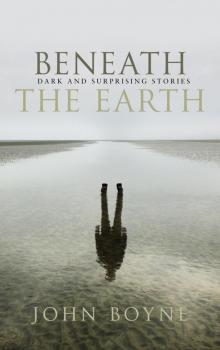 Beneath the Earth
Beneath the Earth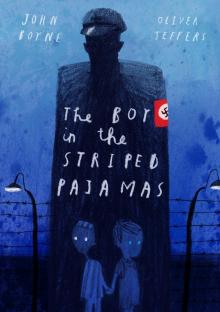 The Boy in the Striped Pajamas
The Boy in the Striped Pajamas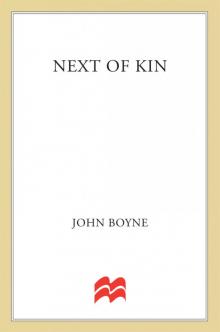 Next of Kin
Next of Kin The House of Special Purpose
The House of Special Purpose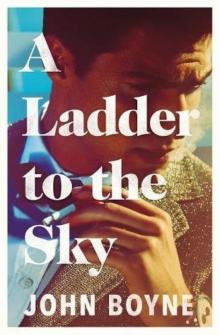 A Ladder to the Sky
A Ladder to the Sky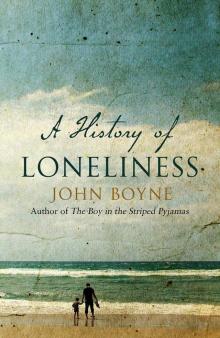 A History of Loneliness
A History of Loneliness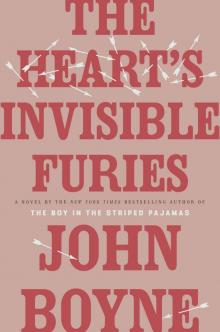 The Heart's Invisible Furies
The Heart's Invisible Furies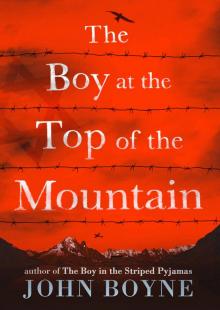 The Boy at the Top of the Mountain
The Boy at the Top of the Mountain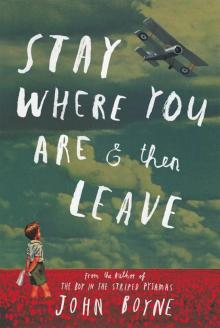 Stay Where You Are and Then Leave
Stay Where You Are and Then Leave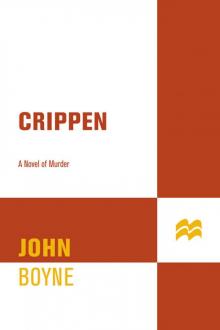 Crippen: A Novel of Murder
Crippen: A Novel of Murder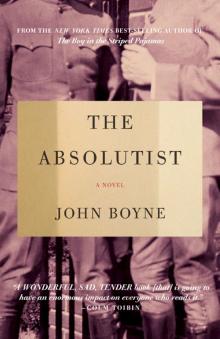 The Absolutist
The Absolutist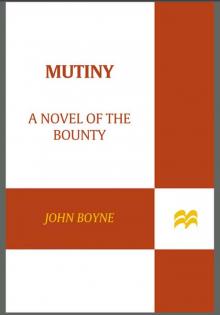 Mutiny: A Novel of the Bounty
Mutiny: A Novel of the Bounty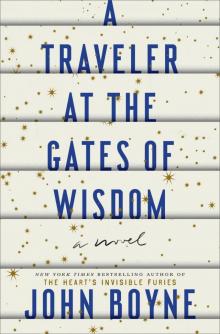 A Traveler at the Gates of Wisdom
A Traveler at the Gates of Wisdom The Congress of Rough Riders
The Congress of Rough Riders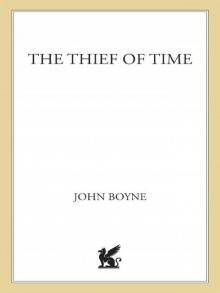 The Thief of Time
The Thief of Time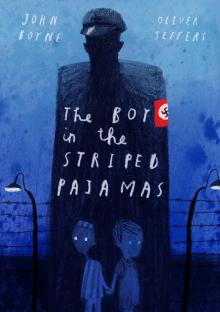 The Boy in the Striped Pajamas (Deluxe Illustrated Edition)
The Boy in the Striped Pajamas (Deluxe Illustrated Edition)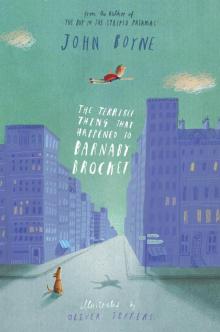 The Terrible Thing That Happened to Barnaby Brocket
The Terrible Thing That Happened to Barnaby Brocket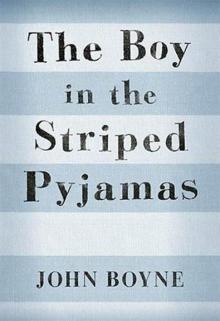 The Boy In The Striped Pyjamas
The Boy In The Striped Pyjamas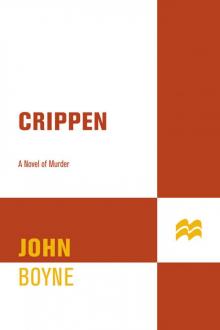 Crippen
Crippen